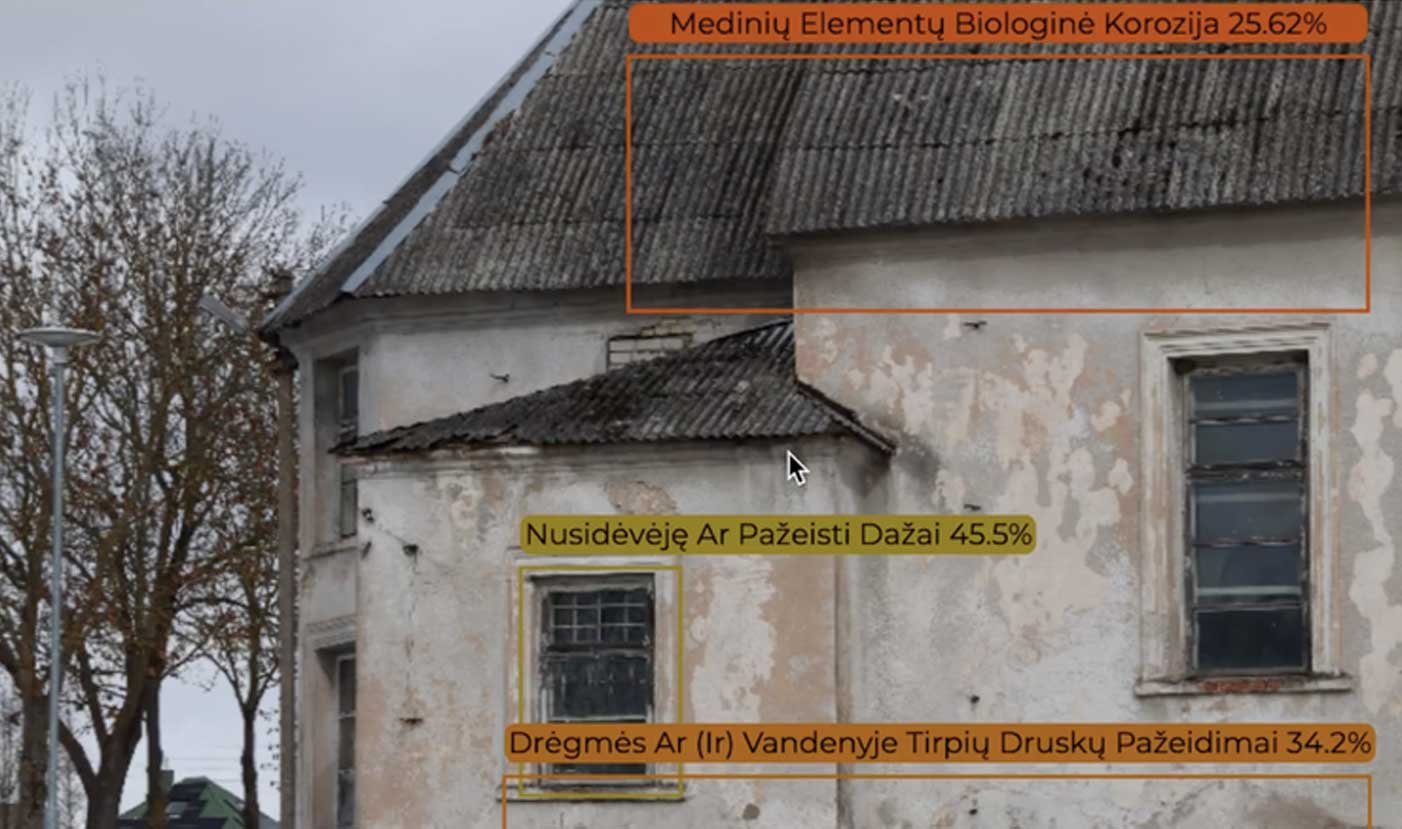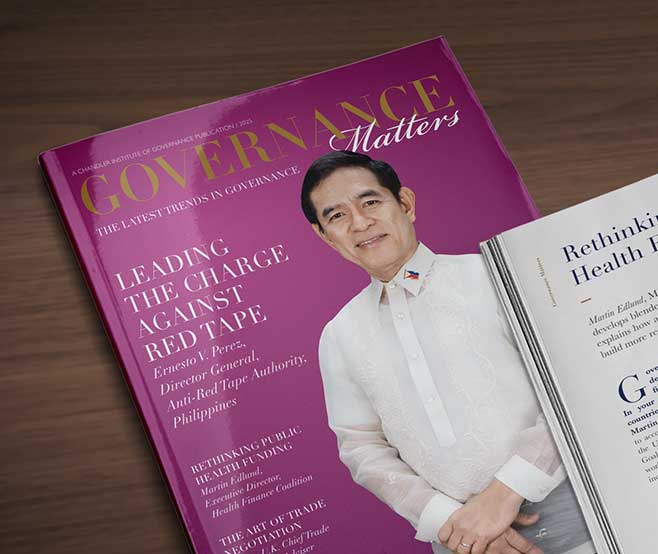Working Together to Solve Global Challenges
Fabrice Filliez, the Swiss Ambassador to Singapore, shares his experience working in the diplomatic arena and tells Governance Matters why Switzerland is an ardent champion of multilateralism.
Lorem ipsum dolor sit amet, consectetur adipiscing elit, sed do eiusmod tempor incididunt ut labore et dolore magna aliqua. Ut enim ad minim veniam, quis nostrud exercitation ullamco laboris nisi ut aliquip ex ea commodo consequat. Duis aute irure dolor in reprehenderit in voluptate velit esse cillum dolore eu fugiat nulla pariatur.
Heading 1
Heading 2
Heading 3
Heading 4
Heading 5
Heading 6
Lorem ipsum dolor sit amet, consectetur adipiscing elit, sed do eiusmod tempor incididunt ut labore et dolore magna aliqua. Ut enim ad minim veniam, quis nostrud exercitation ullamco laboris nisi ut aliquip ex ea commodo consequat. Duis aute irure dolor in reprehenderit in voluptate velit esse cillum dolore eu fugiat nulla pariatur.
Block quote
Heading 6
Ordered list
- Item 1
- Item 2
- Item 3
Unordered list
- Item A
- Item B
- Item C
Bold text
Emphasis
Superscript
Subscript
Governance Matters: How does the Government of Switzerland ensure that the positive effects of successful international partnerships and cooperation benefit the Swiss economy and society?
Fabrice Filliez: The Swiss political system is firmly based on the notion of power-sharing and the inclusion of a broad range of interests. We have a multiparty government. When decisions are being prepared and elaborated, many different Actors — from the private sector to civil society — are consulted to take their perspectives into account.
To give you an example, the government regularly defines foreign policy strategies for specific regions and topics. As priorities and objectives are identified, we test them with different stakeholders before they are adopted. We call this a ‘Whole of Switzerland’ approach — one that closely links domestic and foreign policy. This helps make sure that Swiss international activities are to the benefit of our society at large.
In the last few years, many have argued that the world has seen a slowdown or reversal in globalisation. Global travel has been curtailed, and many countries are taking more nationalist perspectives. Do you think it is important that governments continue to invest in multilateral cooperation, and why?
Switzerland has been an ardent defender of multilateralism for many years, and is bound to remain so. Most challenges of today and tomorrow are global and require global solutions. Further, multilateralism gives small and medium states a seat at the table in a world that is otherwise increasingly dominated by great power policies and rivalries. We regard it as the cornerstone of a functioning and fair international order. This is also why Switzerland, for the first time, submitted its candidacy for a non-permanent seat in the United Nations (UN) Security Council.
One of our priorities is to strengthen international Geneva as a hub for global governance and for discussing new challenges related to digitalisation and technological advancements. Based on its neutrality and stability, Switzerland has long been host to many international organisations — so it is only natural that we give much thought to the question of how multilateralism will have to look like to address future issues.
Opportunities that come from in-person high-level meetings and dialogues have been disrupted due to the stop in international travel. How has your Embassy and the Federal Department of Foreign Affairs of Switzerland adapted to ensure that important diplomatic work still takes place?
On the one hand, digitalisation has rapidly advanced in our department in the past two years. This has allowed us to continue with most of the work, even though some important international negotiations as well as larger events at the Embassy have been postponed. Diplomats have come up with innovative tools to maintain foreign policy, such as conducting international negotiations online and transforming certain diplomatic events into virtual get-togethers.
On the other hand, the pandemic illustrated how important personal contacts still are in diplomacy. This is why we have invested much in making sure that international Geneva, which is the main UN hub in Europe and especially important for Switzerland’s traditional role as a facilitator for diplomatic talks on neutral ground, was up and running fairly quickly again.

At the start of the pandemic, Switzerland very quickly dedicated itself to swift and unbureaucratic response to humanitarian aid, development goals and global cooperation. How does this fit into Switzerland’s strategy to combat COVID-19?
Obviously, communicable diseases and their consequences do not stop at borders, and it is therefore important for Switzerland’s security to counter global health risks across borders and to strengthen the health and economic systems in developing countries. Switzerland’s response is aimed at taking effective measures to counter the health, economic and social consequences of the pandemic in developing countries and humanitarian contexts. This is also in line with the 2021-2024 international cooperation strategy, which is designed to be flexible and allows for a targeted response to needs.
Since the outbreak of the Delta variant this year, Switzerland has sent relief supplies abroad to combat the pandemic, mostly to Asia. Ventilators, oxygen concentrators, and medical protective equipment were sent to Uzbekistan, Vietnam, Thailand, Indonesia, Mongolia, Sri Lanka, Nepal, and India. Since the beginning of the COVID-19 pandemic, Switzerland has been continuously monitoring developments in the global public health situation and is ready to provide as much support as it can upon request. In this context, I welcome the close cooperation between Singapore and Switzerland as co-chairs of the ‘Friends of COVAX Facility’, supporting vaccine multilateralism with the goal to ensure affordable, fair, and equitable access to safe COVID-19 vaccines for all.
Your previous work at the Swiss State Secretariat for International Financial Matters helped place Switzerland on the path to strengthen its reputation in global taxation and transparency. What were some of the initial challenges your team faced, from planning to implementation of taxation reporting standards across a vast number of countries?
If Switzerland says “yes” to an international standard, then it implements it very seriously. This sometimes takes a little longer because everything has to be legally secured and the implementation has to be bindingly regulated with the financial industry. Communicating this internationally was not an easy task. It took a lot of persuasion, but we were able to convince the international community by demonstrating, in practice, that Switzerland takes its international obligations for tax transparency seriously and implements them. Being involved in these challenging international discussions on tax transparency was a unique professional experience.
Multilateralism gives small and medium states a seat at the table in the world that is otherwise increasingly dominated by great power policies and rivalries. We regard it as the cornerstone of a functioning and fair international order. This is also why Switzerland for the first time is a candidate for a nonpermanent seat in the United Nations Security Council.
You have had a long and illustrious career in multilateral and diplomatic work. What advice do you have for young government officers who are starting off their diplomatic careers?
I would give the following advice to young government officers who are starting off their diplomatic careers: keep on building your skills and competencies, diversify your experience, and specialise in one to three diplomatic fields Invest in constantly building up your network and nurture your contacts over time. Stay curious and look at everything as a learning exercise. For example, digital diplomacy skills have become more and more relevant in today’s world. Think hard about the personal lessons and best practices you have learned. Try to get postings in bilateral and multilateral environments. Be open towards postings you weren’t planning for, as all postings offer development opportunities. Take initiative. Don’t be afraid to fail as you will learn from failures, too. Last but not least, lead by example, and with respect and humility, always in the interests of the state you are representing.

Heading 1
Heading 2
Heading 3
Heading 4
Heading 5
Heading 6
Lorem ipsum dolor sit amet, consectetur adipiscing elit, sed do eiusmod tempor incididunt ut labore et dolore magna aliqua. Ut enim ad minim veniam, quis nostrud exercitation ullamco laboris nisi ut aliquip ex ea commodo consequat. Duis aute irure dolor in reprehenderit in voluptate velit esse cillum dolore eu fugiat nulla pariatur.

Block quote
Ordered list
- Item 1
- Item 2
- Item 3
Unordered list
- Item A
- Item B
- Item C
Bold text
Emphasis
Superscript
Subscript
Lorem ipsum dolor sit amet, consectetur adipiscing elit, sed do eiusmod tempor incididunt ut labore et dolore magna aliqua. Ut enim ad minim veniam, quis nostrud exercitation ullamco laboris nisi ut aliquip ex ea commodo consequat. Duis aute irure dolor in reprehenderit in voluptate velit esse cillum dolore eu fugiat nulla pariatur.
Endnotes
- Item 1
- Item 2
- Item 3


Fabrice Filliez is a career diplomat. Prior to his appointment as Ambassador to the Republic of Singapore and Brunei, Fabrice Filliez served in Berne for five years at the Swiss State Secretariat for International Financial Matters with the title of Ambassador in charge of multilateral tax matters. He was responsible for representing Switzerland’s interests in important multilateral tax negotiations, in particular, at the Global Forum on Tax Transparency and Exchange of Information. Previously, he served as Head of the Economic and Finance Section of the Swiss Embassy in London. Other positions during his career included appointments at the Swiss Mission to the European Union in Brussels and at the Directorate for European Affairs in Berne, postings where he was actively involved in various Swiss-EU negotiations, as well as at the Directorate for Public International Law, Berne, Switzerland. Fabrice Filliez graduated from the University of Geneva with a Degree in Law and holds a Master’s in European Law from the University of Brussels, Belgium.
Lorem ipsum dolor sit amet, consectetur adipiscing elit, sed do eiusmod tempor incididunt ut labore et dolore magna aliqua. Ut enim ad minim veniam, quis nostrud exercitation ullamco laboris nisi ut aliquip ex ea commodo consequat. Duis aute irure dolor in reprehenderit in voluptate velit esse cillum dolore eu fugiat nulla pariatur.













